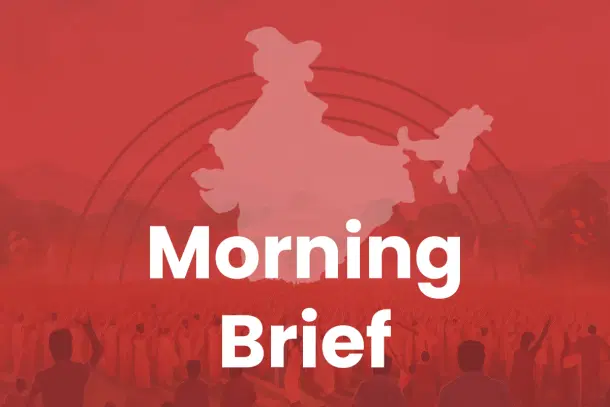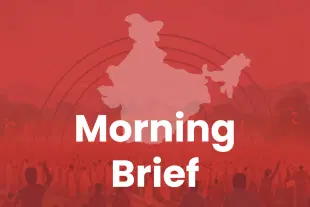News Brief
Morning Brief: India Goes For Trudeau’s Jugular; Washington Post Amplifies Canadian Propaganda; India Tells US It Has Arrested Suspect In Pannun Assassination Plot
Swarajya Staff
Oct 15, 2024, 06:04 AM | Updated 06:04 AM IST
Save & read from anywhere!
Bookmark stories for easy access on any device or the Swarajya app.


Dear reader, we're stepping away from the usual format of the Swarajya Morning Brief as we take a break to focus on a major development that has overshadowed all other news.
India-Canada relations have reached a breaking point.
In the past 12 hours, India has recalled its top diplomats in Ottawa and expelled six Canadian diplomats. This comes after Canadian Prime Minister Justin Trudeau, in a last-ditch effort to keep his political career from going up in flames, has decided to recklessly push the accusation that India orchestrated killings on Canadian soil.
It seems he’s trying to curry favour with the Sikh voting bloc while also conveniently deflecting attention from the heat he’s facing in Canada over Chinese interference in two consecutive elections—in favour of, surprise-surprise, himself.
In this context, let’s give you the lowdown on what’s currently happening.
1) India Goes For Trudeau’s Jugular
In an uncharacteristically strong statement, the Narendra Modi government has put Trudeau on the stake, calling out his desperate political gambit.
The MEA points out that Trudeau is pushing "foreign interference" allegations against India at a time when he is under fire for foreign interference in Canadian politics. While India did not mention China, it is now widely recognised that Beijing interfered in Canada’s 2019 and 2021 elections—an issue the Indian statement alludes to.
Chinese interference aimed to favour candidates aligned with Beijing’s strategic interests by discouraging votes for the Conservative Party, which China viewed as anti-Beijing. China’s desired outcome—a Trudeau minority government—was successfully achieved.
The statement doesn't stop there. It further humiliates Trudeau by reminding him how his 2018 visit to India, intended to "curry favour with a vote bank" back home, had "rebounded to his discomfort." It also mentions Trudeau’s "naked interference in Indian internal politics in December 2020," when the Canadian Prime Minister recklessly supported violent protests in India against farm laws.
The statement wouldn't be complete without a jab at Trudeau's humiliating dependence on terror sympathiser Jagmeet Singh, and the MEA delivered. It pointed to the Canadian Prime Minister's reliance "on a political party whose leader openly espouses a separatist ideology vis-à-vis India"—a direct hit at the NDP under Singh's leadership.
2) Washington Post Amplifies Canadian Propaganda
The Washington Post is at it again, doing what it does best—mindlessly amplifying anything and everything fed to it by Western intelligence agencies.
Here are some interesting tidbits:
One, the report states that since Nijjar’s death, the pace of threats to Khalistanis has escalated to such an extent that Canadian authorities have warned a dozen individuals of Indian descent [read: Khalistani terrorists] that they could be targeted.
If this is true, it seems Trudeau's baseless accusations against India for Nijjar's killing have achieved quite the unintended result. Who would have thought?
Second, WaPo launches into a tirade about "mounting concerns among Western security officials" regarding India practicing “transnational repression” — using violence to neutralise perceived adversaries who have sought refuge abroad.
It’s a shame WaPo wasted so much space on this when it could have simply stated that Western intelligence agencies are increasingly worried that India is targeting their assets in ways they’ve been employing for decades.
Three, the DC Echo Chamber leans into Canada’s propaganda by trying to paint Ajit Doval as confused during his meeting with Canadian officials.
Instead of giving Doval the credit he deserves as a seasoned spymaster, they’ve swallowed Canada’s narrative whole, clearly aiming to smear his reputation.
The idea that Doval didn’t know who Lawrence Bishnoi was sounds more like a desperate ploy from Canada to shift the blame and distract from its own problems.
Doval’s acknowledgment in the meeting of using diplomats for surveillance activities is framed as scandalous, yet it’s a common practice in global intelligence.
WaPo tries to reduces Doval to a caricature of a bumbling official, all to fuel a sensational narrative that plays into the paper's tendency to amplify Western propaganda.
3) India Arrests Man Accused Of Plotting To Kill Terrorist Pannun
While Canada accused India of involvement in the killing of terrorist Hardeep Singh Nijjar, its Five Eyes partner, the US—likely the source of the "intelligence" Trudeau used for his allegations—has also claimed that New Delhi is implicated in a plot to eliminate another Khalistani terrorist, Gurpatwant Singh Pannun, a US citizen.
According to a report in the Hindustan Times, India has informed the US that it has arrested the individual identified as “CC1” in a US Department of Justice indictment, which implicated this person in directing the assassination plot.
India also clarified to the US that CC1 is no longer a government official and that the high-level inquiry committee established in the wake of the allegations is continuing to investigate this individual's other connections.
On Monday, the US announced that an Indian inquiry committee is set to travel to the country on Tuesday, 15 October, as part of an investigation into allegations linking an Indian government official to a foiled assassination plot against Pannun.
However, the statement was later retracted.
4) India's Differing Responses To The US And Canada
The contrasting responses from India regarding allegations from the US versus those from Canada have sparked considerable scrutiny.
Why such a disparity?
One possible explanation is that the US has chosen to approach the matter with a measured tone, limiting its concerns to general complaints. The US knows that India's grievance with Pannun is valid, even if it doesn’t publicly acknowledge it. It has also made no attempt to implicate senior Indian officials in the matter.
In contrast, Trudeau has adopted a confrontational approach toward India, despite Canadians being well aware of India’s sensitivities regarding the issue.
Moreover, the Canadian Prime Minister is using this situation as a tool for domestic political signalling to the Sikh community, viewing them as a vote bank.
Patience with Trudeau and his government has been wearing thin in Delhi for years.
5) What's Likely To Happen Next
The current escalation is unlikely to be the last.
Trudeau has had his say on the matter, declaring, “We will never tolerate the involvement of a foreign government threatening and killing Canadian citizens on Canadian soil”—except, of course, when it comes to China’s meddling in Canadian elections to boost his political career. He even went as far as to say, "India has made a monumental mistake."
Now, it's India's turn to respond, and that response is likely to pack a punch.
While External Affairs Minister S Jaishankar is currently in Islamabad for the SCO Summit, which begins later today, he is expected to lead India's response to Trudeau's tirade.
Stay with us for real-time updates as this story unfolds throughout the day.





